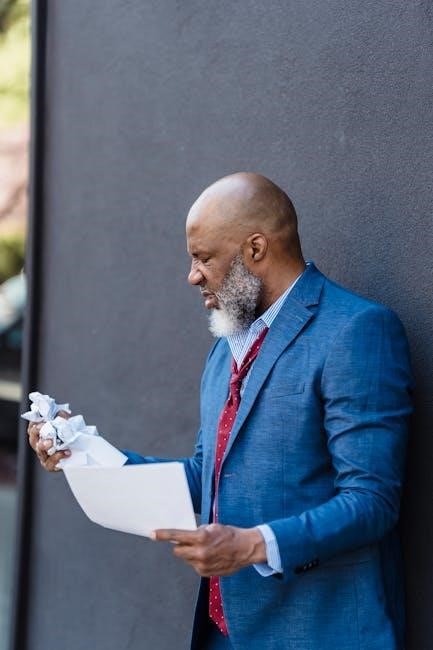
the conflict management skills for leaders reader pdf
Boost your leadership effectiveness with our free PDF guide! Discover practical strategies and expert tips to resolve conflicts and lead your team confidently.
Conflict management is a vital skill for leaders, enabling them to navigate disagreements and foster collaboration. Effective leaders transform conflicts into opportunities for growth and innovation, ensuring harmony and productivity within teams. Strong conflict resolution abilities enhance trust, improve communication, and promote a positive work environment, making it essential for successful leadership.
1.1 Understanding the Importance of Conflict Management in Leadership
Conflict management is essential for leaders to maintain team cohesion and productivity. Effective leaders recognize that unresolved conflicts can escalate, damaging relationships and performance. By mastering conflict resolution, leaders foster trust, improve communication, and create an environment where diverse perspectives drive innovation. Conflict, when managed well, strengthens collaboration and accountability, ensuring sustainable success. Leaders who prioritize conflict management cultivate resilient teams capable of navigating challenges and thriving in dynamic environments.
1;2 The Role of Leaders in Conflict Resolution
Leaders play a pivotal role in conflict resolution by fostering a constructive environment for dialogue and collaboration. They must remain impartial, encourage open communication, and guide parties toward mutually beneficial solutions. Effective leaders use conflict as an opportunity to strengthen team cohesion and trust. By promoting respect and understanding, they empower individuals to address disagreements positively. Leaders who excel in conflict resolution inspire collaboration, drive innovation, and ensure sustainable team success in challenging situations.

Key Conflict Management Styles for Leaders
Leaders employ various conflict management styles, including dominance, avoidance, accommodation, compromise, and collaboration. Each style requires adaptability to suit the situation and promote effective resolution.
2.1 Overview of Conflict Management Styles
Conflict management styles vary, with leaders often adopting approaches like avoidance, accommodation, compromise, or collaboration. Each style suits different scenarios, requiring adaptability. Avoidance delays resolution, while accommodation prioritizes harmony. Compromise balances interests, and collaboration seeks mutually beneficial solutions. Understanding these styles helps leaders choose the most effective approach, fostering trust and productivity. Effective style selection depends on context, ensuring conflicts are resolved constructively rather than escalating tensions or stifling creativity.
2.2 Dominance, Avoidance, Accommodation, Compromise, and Collaboration
Leaders employ diverse conflict management styles, each with unique outcomes. Dominance emphasizes assertiveness, often leading to quick decisions but risking resentment. Avoidance postpones resolution, suitable for minor issues. Accommodation prioritizes harmony, sacrificing one’s needs; Compromise balances interests, offering a middle ground. Collaboration seeks mutually beneficial solutions through teamwork. Each style’s effectiveness depends on context, requiring leaders to adapt their approach to foster productivity, trust, and satisfaction. Mastering these styles enables leaders to navigate conflicts strategically and maintain team cohesion.
Effective Communication in Conflict Resolution
Effective communication is crucial in conflict resolution, involving active listening, empathy, and clear expression of thoughts. Leaders must ensure non-verbal cues align with their message, focus on issues rather than individuals, and ask open-ended questions to clarify concerns. Acknowledging perspectives fosters respect and encourages constructive dialogue, ultimately building trust and fostering mutually beneficial resolutions.
3.1 Active Listening and Empathy in Conflict Management
Active listening and empathy are cornerstone skills in conflict management, enabling leaders to deeply understand diverse perspectives. By fully engaging with others’ viewpoints, leaders can address concerns effectively, fostering trust and collaboration. Empathy allows leaders to acknowledge emotions, while active listening ensures accurate comprehension. These skills help de-escalate tensions, uncover underlying issues, and create an environment where all parties feel heard and valued, paving the way for constructive conflict resolution.
3.2 Clear and Constructive Communication Techniques
Clear and constructive communication is essential for effective conflict resolution. Leaders should use “I” statements to express feelings without blame, focus on specific issues, and avoid generalizations. Encouraging open dialogue and maintaining a calm tone helps create a safe environment for discussion. Clarifying expectations and seeking mutual understanding fosters collaboration. Non-verbal cues, such as eye contact and nodding, also convey attentiveness and respect. These techniques ensure that communication remains focused, respectful, and aimed at finding solutions rather than escalating tensions.

Negotiation and Mediation Skills for Leaders
Negotiation and mediation are crucial for resolving workplace conflicts. Leaders skilled in these areas ensure fair outcomes, maintain team harmony, and foster productive relationships.
4.1 Negotiation Strategies to Resolve Conflicts
Negotiation strategies are essential for leaders to resolve conflicts effectively. Active listening, remaining impartial, and focusing on mutual interests are key. Leaders should encourage open dialogue, seek creative solutions, and use objective criteria to reach fair agreements. Separating people from the issue ensures emotions do not derail negotiations. Building trust and fostering collaboration helps parties feel heard and valued. Transparent communication and a willingness to compromise are vital for achieving sustainable outcomes that satisfy all stakeholders while maintaining relationships. Consistency and patience are also critical in complex negotiations.
4.2 Mediation Techniques for Effective Conflict Resolution
Mediation techniques involve a neutral third party facilitating discussions to resolve conflicts. Leaders can act as mediators by creating a safe environment, encouraging open communication, and guiding the conversation without imposing solutions. Active listening, maintaining neutrality, and fostering constructive dialogue are key. Mediation helps identify common goals, clarify misunderstandings, and build consensus. Leaders should remain impartial, focus on interests rather than positions, and help parties develop mutually beneficial solutions. Mastering mediation enhances collaboration, reduces tension, and strengthens team cohesion, making it a valuable skill for effective conflict resolution.
Emotional Intelligence and Conflict Management
Emotional intelligence enables leaders to recognize and manage emotions, fostering empathy and calm in conflicts. It enhances understanding, de-escalates tensions, and promotes constructive dialogue for resolutions.
5.1 The Role of Self-Awareness in Conflict Management
Self-awareness is crucial in conflict management, enabling leaders to recognize and regulate their emotions. By understanding their emotional triggers, leaders can remain calm and objective, fostering rational decision-making. This awareness helps in identifying personal biases, preventing emotional escalation, and promoting empathy. Self-awareness also enhances a leader’s ability to communicate effectively, de-escalate tensions, and navigate conflicts constructively. It lays the foundation for emotional intelligence, which is vital for resolving disputes and maintaining harmony within teams.
5.2 Managing Emotions to Foster Constructive Conflict Resolution
Managing emotions is essential for constructive conflict resolution, as uncontrolled emotions can escalate disputes. Leaders who regulate their feelings remain calm and composed, enabling rational decision-making. This emotional mastery fosters a positive environment, encouraging open dialogue and reducing defensiveness. By managing their own emotions, leaders set an example, inspiring others to approach conflicts calmly. This emotional discipline promotes mutual respect, creativity, and collaboration, turning conflicts into opportunities for growth and understanding.
Decision-Making and Problem-Solving in Conflicts
Effective decision-making and problem-solving are crucial in conflicts, enabling leaders to resolve disputes and maintain team cohesion. Fair, objective decisions de-escalate tensions and promote constructive resolution.
6.1 Collaborative Problem-Solving Approaches
Collaborative problem-solving involves engaging all parties in identifying and addressing the root causes of conflicts. Leaders encourage open dialogue, fostering a shared understanding of issues and goals. Active listening, empathy, and clear communication are essential for building trust. By brainstorming solutions together, teams can create mutually beneficial outcomes. This approach not only resolves conflicts but also strengthens relationships and enhances team cohesion. It emphasizes collective responsibility and shared success, ensuring sustainable resolutions that align with organizational objectives and values.
6.2 Making Objective and Fair Decisions
Making objective and fair decisions is crucial in conflict management. Leaders must remain impartial, gathering all relevant facts and considering diverse perspectives. Active listening and empathy help ensure decisions are equitable. By involving parties in the decision-making process, leaders foster transparency and ownership. Fairness builds trust and accountability, while arbitrary decisions can escalate tensions. Leaders must balance organizational goals with individual needs, ensuring outcomes are justified and align with ethical standards. This approach strengthens credibility and promotes long-term harmony.

Cultural Competence in Conflict Management
Cultural competence is essential for leaders to manage conflicts effectively across diverse teams. Understanding cultural differences in communication and conflict styles fosters mutual respect and collaboration.
7.1 Understanding Cultural Differences in Conflict Styles
Cultural differences significantly influence conflict management approaches. Leaders must recognize that diverse cultures may prioritize direct vs. indirect communication, individualism vs. collectivism, or hierarchical vs. egalitarian structures. For instance, some cultures value harmony and avoid confrontation, while others embrace open debate. Understanding these nuances allows leaders to adapt their conflict resolution strategies, fostering respect and collaboration across diverse teams. Cultural competence ensures that leaders can navigate conflicts sensitively, respecting varying norms and values to achieve constructive outcomes;
7.2 Leading Diverse Teams Through Conflict
Leading diverse teams through conflict requires cultural competence and adaptability. Leaders must bridge cultural gaps by fostering open communication and mutual respect. By understanding individual perspectives and values, leaders can mediate disputes constructively. Encouraging inclusivity and active listening helps build trust among team members. Effective leadership in diverse conflicts promotes collaboration, innovation, and shared goals, transforming challenges into opportunities for growth and strengthened relationships within the team.

Continuous Improvement in Conflict Management Skills
Continuous improvement in conflict management involves learning from past conflicts, seeking feedback, and engaging in ongoing training to refine skills and adapt to new challenges.
8.1 Learning from Past Conflicts
Learning from past conflicts is crucial for improving conflict management skills. Reflecting on previous disputes helps leaders identify patterns, strengths, and areas for growth. By analyzing what worked and what didn’t, leaders can refine their strategies and develop more effective approaches. Seeking feedback from involved parties provides additional insights, fostering personal and professional development. Documenting lessons learned ensures continuous improvement, enabling leaders to handle future conflicts with increased confidence and competence, ultimately enhancing team dynamics and organizational success.
8.2 Seeking Feedback and Training Opportunities
Seeking feedback and training is essential for enhancing conflict management skills. Leaders can benefit from professional development programs, workshops, and coaching sessions. Receiving constructive feedback from colleagues or mentors provides insights into personal strengths and areas for improvement. Engaging in continuous learning ensures leaders stay updated on effective conflict resolution techniques, fostering better communication and negotiation abilities. Actively pursuing growth opportunities strengthens their capacity to manage conflicts constructively, leading to improved team cohesion and decision-making outcomes.